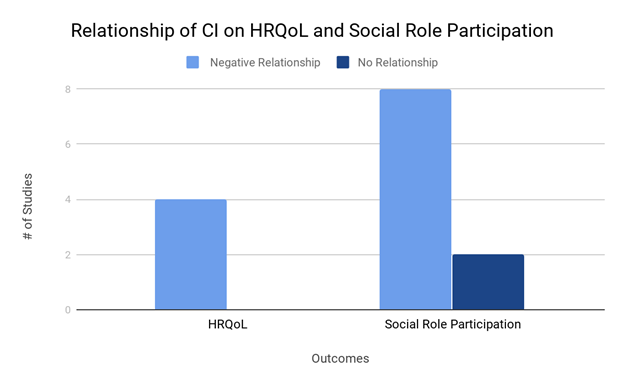Session Information
Session Type: Poster Session (Monday)
Session Time: 9:00AM-11:00AM
Background/Purpose: Systemic Lupus Erythematosus (SLE) is a chronic autoimmune disease affecting multiple organ systems. Approximately 33 to 43% of individuals with SLE experience cognitive impairments (CI) such as declines in attention/concentration, verbal fluency, visuo-spatial constructions, memory, processing speed and/or executive functions. Patients report significant effects of CI on Health Related Quality of Life (HRQoL), health status, and social participation roles. However, the quantitative data regarding the relationship of CI on these outcomes has not been synthesized. The objective of this review is to critically appraise and synthesize literature on the relationship of CI on HRQoL, health status, and social participation roles in individuals with SLE.
Methods: Six electronic databases were searched using a wide search strategy and the support of a librarian. Two reviewers (SA, LK) independently completed all phases of the review (title/abstract screening, full-article selection, quality rating, extraction), and a third reviewer resolved disagreement (LE). Forward and backward citation searches of included articles were completed to ensure relevant articles were identified. Fourteen articles were selected for this review.
Results: Five thousand six hundred fifty- two titles were identified and screened. Fourteen articles were included in the data extraction process. Twelve of the fourteen articles found the presence of CI negatively correlated with individuals’ HRQoL and social participation roles such as employment status, academic performance and valued life activities (Figure 1). The most common cognitive domains assessed in these studies were memory, attention, language and executive function. The two articles that did not find a relationship had a small sample size and unclear methodology. There was heterogeneity of measures used between studies: eight articles used different cognitive batteries, two articles used a self- report cognitive measure, and the remaining four articles used a brief cognitive screening measure to assess cognition. Three different HRQoL measures were used in the four articles examining HRQoL; all articles examining social role participation used different measures to assess social role participation. Studies were unable to be pooled for meta-analysis secondary to the heterogeneity across measures used.
Conclusion: Cognitive impairments are negatively related to HRQoL and social role participation in SLE patients. Healthcare professionals need to be aware of this relationship so that they are addressed in clinical practice. Further research is needed across different SLE patients using standardized metrics to enable pooling of data. Also, research examining a broader set of social participation roles, such as leisure, family and community roles, would provide more understanding of the effects of CI in SLE patients. Future research focusing on creating evidence-based treatment plans targeting CI, life roles participation, and/or HRQoL is needed.
To cite this abstract in AMA style:
Alfred S, Khoja L, Anderson M, Touma Z, Engel L. Cognitive Impairments in SLE Negatively Related to Participation and Quality of Life: A Systematic Review [abstract]. Arthritis Rheumatol. 2019; 71 (suppl 10). https://acrabstracts.org/abstract/cognitive-impairments-in-sle-negatively-related-to-participation-and-quality-of-life-a-systematic-review/. Accessed .« Back to 2019 ACR/ARP Annual Meeting
ACR Meeting Abstracts - https://acrabstracts.org/abstract/cognitive-impairments-in-sle-negatively-related-to-participation-and-quality-of-life-a-systematic-review/

